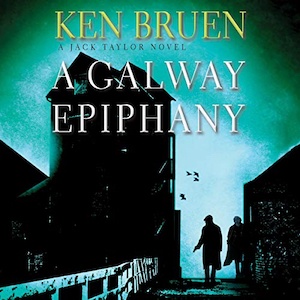
Narrated by Gerry O’Brien — A Galway Epiphany is the 17th novel in award-winning Irish author Ken Bruen’s long-running series involving former Garda detective Jack Taylor. Now a private investigator, he has had a haphazard career since being thrown off the force for excessive drinking and the poor judgement that comes with it. Taylor has found some solace staying on a farm owned by his friend Keefer, once a roadie for the Rolling Stones, and their falcon, Maeve.
Bruen begins with musings on the seven epiphanies identified by a mid-18th century monk who called them ‘blends of blessed curses and cursed blessings’. Such a pregnant statement was sure to cast its spell over the ensuing story, and indeed it does.
Two children from a Galway refugee encampment are seen near the Irish Famine Memorial overlooking the sea on the outskirts of the Claddagh. They light a candle, and the girl whispers, ‘Here’s a trick I learned in Guatemala.’ She causes a blue light to shimmer over their heads, observed and filmed by tourists, as the girl exclaims in supposed wonderment, ‘La Madonna.’ That is all the public needs for a frenzy of speculation and enshrinement to be launched.
Soon thereafter, Jack is in town on business and is hit by a truck. A big one. He’s in a coma for some weeks but is otherwise unscathed. Observers saw the children who conjured the blue light bending over him, presumably tending to him, and his lack of injuries is interpreted as the first miracle associated with the blue light phenomenon.
Various characters wander into the story to complicate Jack’s life. They include his long-time acquaintance, Father Malachy, who is vainly hoping for a bishopric. Now suffering a debilitating illness, Malachy wants Jack to kill him. There are other minions of Rome as well, such as a spiffily dressed oddball whose calling card is a long matchstick, and a California woman starting her own religious sisterhood. Even in his enfeebled post-coma state Jack spots this as a scam. The main thing this wildly divergent trio has in common is they’d like to get their hands on the miracle children. The Church wants to discredit them, the arsonist and the fake sister want to exploit them, and all of them want Jack to help find the children. But are the miracle children innocents or exploiters themselves?
Even out in remote Galway, Jack can’t even take a seaside walk without someone accosting him and asking for aid. Another is the father of a young girl who committed suicide after relentless Internet trolling. She hanged herself with the navy knit necktie she’d given her dad for his birthday. Having lost a daughter himself, Jack can’t say no.
Jack is irreligious in the best of times – hostile would be pretty much on the mark – and is disgusted by the machinations of the miracle-seekers and quashers alike. He just wants to go back to the farm. His drinking is getting out of control, and he’s not as much help to anyone as he needs to be.
Bruen is a master of the apt witticism and nicely placed literary quote. Because the story is told by Jack in first person, his prejudices and cynicism and erudition are allowed full rein. Despite the abundant humour, a pall hangs over the tale, like the smoke from one of the match-toting arsonist’s fires, and you may sense that events will end badly for everyone. This impression is aided by the sadly ironic reading by superb audiobook narrator Gerry O’Brien, who wrings every drop of Jameson-soaked humour and regret out of Bruen’s text. An audiobook with a skilled narrator is a thing of joy, and O’Brien makes you believe for a few hours, that you too are in Galway, sitting on a barstool next to Jack, puzzling out the Fates.
Read our previous reviews of Purgatory and In the Galway Silence, both by the same author.
Head of Zeus
Audiobook/Print/Kindle/iBook
£28.08
CFL Rating: 4 Stars










